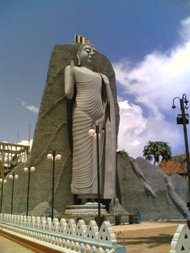Democracy, democracy, no it is oil, oil in Myanmar - Daily Mirror
As thousands of Buddhist monks chant 'democracy, democracy' in Myanmar, which many still fondly remember as Burma, 'oil, oil' must be the words being uttered by world leaders contemplating on what to do with or how to respond to events unfolding in the poverty-stricken Asian country.
Who says that it is humanity's concern for fellow human beings that leads to humanitarian intervention? The plight of an oppressed people matters only when it serves the intervening power.
No country wants to risk sending its military to free the oppressed in another country unless economic benefits are associated with such a move.
The situation in Myanmar certainly warrants international intervention. Myanmar's people cry for freedom — freedom from oppression of the junta which is corrupt to the core. But there won't be a military intervention — a la Operation Iraq Freedom. One of the justifications the Bush administration offered in defence of its illegal invasion of Iraq was that the people of Iraq was being oppressed and needed to be freed. But such claims were nothing but an attempt by an arrogant superpower to add a veneer of morality to its preposterously immoral acts.
The people of Myanmar also want democracy. Why is there no attempt to build an international coalition to militarily intervene in Burma and introduce democracy? For 42 years, Myanmar has been under the sway of the military, but the efforts of the international community in restoring democracy in that country are shamefully wanting. In other words, there have been no genuine efforts. There will never be as long as Myanmar's junta is protected by C-China, a nuclear power and rising superpower. The letter C before China could denote anything but the word 'communist', the politically loaded adjective with which it used to strut about at world fora. The words 'capitalist' or 'compromising' could be ideal alternatives.
Any US or Western unilateral attempt to militarily intervene in Myanmar, like they did in Iraq and the Balkans before that, will trigger a major conflict, because for China, Myanmar is too dear a property to be handed over to the West on a platter.
China and Russia have expressed their opposition to tough new measures against Myanmar in the face of ongoing crackdown on Buddhist monks and political activists.
President George W. Bush addressing the United Nations on Tuesday called for new sanctions on Myanmar's ruling junta and urged global pressure for democratic reforms to end the junta's decades-old "reign of fear". But the measures he announced — a tightening of existing economic sanctions and expanding a visa ban on the top leadership — appear cosmetic. Economic sanctions will certainly increase the woes of the poverty-stricken people of Myanmar, which was once regarded as the rice bowl of Asia. Today, its per capita income is a measly $175 dollars, much less than neighbouring Bangladesh.
Myanmar's military leader General Than Shwe, a 70-year-old psy-op expert, could give his daughter a six-rope diamond necklace as one of the wedding gifts, but many Myanmar people live below the poverty line. They have access to electricity only two hours a day, although Myanmar is blessed with an accursed liquid — oil — the hunt for which is the prime cause of many modern-day conflicts.
The West, with its eye on oil, will not act tough. If it does so, it will only increase the junta's ties with China. The people of Myanmar say soon China will own Myanmar. They call China 'Big Daddy'. In an interview with the New York Times last year, one woman called China a good friend of the Myanmar government, not its people. "They are like brother and brother-in-law," she said of the two governments.
The energy rush
The junta feels more secure than ever because they know all big powers want a share in the oil pie. In the 1990s, huge pockets of natural gas were found in Myanmar which also has vast reserves of offshore oil.
The discovery of oil and gas changed the way regional and global powers looked at or dealt with Myanmar. It is true that since the energy rush, the western and regional powers have been criticizing Myanmar for its human rights record. But such criticisms end at lip level. They are not converted into tough meaningful actions, like the way Saddam Hussein's Iraq had been subjected to, at the cost of half a million deaths of Iraqi children, for 12 long years. Instead of any military action on humanitarian grounds, all regional and global powers jostled to sign oil and gas deals with Myanmar. Even India, the largest democracy in the world, abandoned its policy of supporting the democracy movement in Myanmar. Even as the Buddhist monks were taking to the streets in protest last week, India's Energy Minister was in Myanmar, negotiating multi-billion dollar gas deals.
China, of course, has the biggest share in the pie. It is planning to build a major plant at Sittwe, to send oil not only from Myanmar but also from Middle East to China via a new pipeline.
The Bush administration has been trying to edge out China. It knows it cannot do this with its military might. So it is whipping up international action and supporting the democracy movement led by Aung San Suu Kyi, the Nobel Peace laureate who has been spending the past 17 years under house arrest. Last year, at the APEC summit in Hanoi, President Bush failed in his effort to get the Asian Pacific states to back his move to condemn the junta, because, besides China, countries such as Singapore, Malaysia, Indonesia Australia, Thailand and Canada, did not want to antagonise the Myanmar regime and lose their business interests. China, especially, regards the region as its domain. Southeast Asia is to China what the Middle East is to the United States. It will not allow other big powers to dominate the region. As things stand today, China feels its interests are best served under a military junta.
China probably feels that a democratic Myanmar can produce a set of rulers who will soon pay obeisance to Washington in return for green bucks. Until and unless the Chinese are certain that democracy will produce a pro-Beijing regime, they will protect the junta, come what may.
But this does not mean, China and the Myanmar junta have blocked the other players from entering the energy sector. Yes, the Untied States, Britain and France are all there. Incidentally, it is these three countries which this week assumed moral high ground to condemn the Myanmar military and called for tough international action.
Since Myanmar liberalized its investment code in late 1988, it has attracted its largest foreign investments in the energy sector. Among those companies that have signed oil and gas exploration contracts with Myanmar are France's Total SA, Chevron of the United States, Malaysia's Petronas, Thailand's PTT Exploration & Production PCL, Daewoo of South Korea, Rimbunan Petrogas Ltd of British Virgins Island and UNOG Pte Ltd of Singapore. Myanmar has also signed deals with companies from India, Australia, Canada and Indonesia.
Russia also a major player
France this week called on Total SA to withdraw from Myanmar. But Britain and the US have avoided similar measures. France could do that because Total's investment in Myanmar is an insignificant portion of its global operation. But US oil giant Chevron, formally Unocal, cannot emulate Total. Chevron is developing Myanmar's Yadana offshore gas field. Britain, meanwhile, ranks as the second largest investor in Myanmar, its former colony.
It is not only China and the West that play oil politics. Russia is also a major player. Last year the number two in Myanmar's military junta visited Moscow and signed a series of gas and oil contracts with government and private investors. Russia is also a major arms supplier to Myanmar.
The speed with which the junta signed these deals with foreign companies have led to allegations by the Myanmar people that the ruling cabal — a 12-member State Peace and Development Council — are enriching themselves by allowing multinational corporations to ruthlessly exploit the country's national wealth.
Incidentally, it is the junta's decision to increase the fuel prices by 500 percent that led to the present protests by the monks.
So it is once again oil politics that shapes international and Myanmar's politics. Myanmar's pro-democracy movement is being crushed and the junta is having a hearty laugh at the failure of the United States and other big powers to prevail on them.





No comments:
Post a Comment